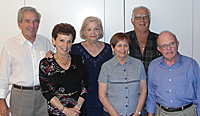By Henry Haas, Special to JTNews
Recently my wife and I spent one week in Berlin, Germany as guests of that city — a far different experience from when I visited in 1963, or when I was three months old and my parents had to flee the city to save our lives.
The city invited us under a program initiated by Germany to reconcile its past with “former persecuted citizens of Berlin.” Trips like these are part of a broader national policy, which tries to make retribution while never forgetting its role.
On April 8, 1938, I was born in Berlin into a Jewish family. We were forced to flee Germany, so my parents and I spent 1939 to 1947 in refuge in Shanghai, China, and subsequently emigrating to the United States in 1947. While in Shanghai, we, along with about 18,000 other Jewish refugees, lived in squalid and poor conditions and, for most of the war, under Japanese occupation.
Now, in September 2009 in Berlin, we were part of a group of 36 former refugees and their spouses or guests who had been born in Berlin between 1931 and 1939 and forced to flee to many parts of the world. Everyone had a story. The participants came from the U.S., England, South America, South Africa, and Israel. The group included a Harvard medical professor, a cinematographer, engineers, librarians, an architect, business people, many from other walks of life, and me — a lawyer. Six of us had spent the war years in Shanghai. We shared our stories of survival, how we made it to our ultimate destinations, made our careers, and grew our families. New friends were made.
The city wined and dined us for seven days, took us on tours of the city to the historical Jewish sites, to the new Jewish Museum of Berlin, and to all of the Holocaust memorials, of which there were many. We visited City Hall, the German Parliament, cruised on the river Spree, and on and on. There were receptions, greetings, and remarks by the mayor of Berlin, the vice president of the German Parliament, the president of the Berlin House of Representatives, and the chief protocol officer of the city. The general tenor of the German representatives was one of accountability, determination that the events of the Holocaust would not be forgotten, and the prevention of a repetition addressed by legislative mandates.
We were even treated to a performance of the opera La Traviata at the restored Berlin Opera house, located adjacent to a plaza where, on May 10, 1933, the Nazi party ordered the burning, in one night, of 20,000 books from authors throughout Germany and the world. Sitting in this plaza is a memorial: A transparent glass panel in the plaza’s center where, upon looking down and through it, one can see only empty library shelves. Nearby is an inscription of a quote from the German philosopher Heinrich Heine: “There, where they burn books, so too in the end will they burn people.”
There were many moving personal moments, such as standing where my family lived, where I was born, where my parents married and where my mother went to school. However, the most moving and emotional event for me was when I stood on the train platform where my grandparents were transported to Auschwitz on March 23, 1943. Tears were shed, a flash of anger erupted.
When in Berlin in 1963, I wanted to see where my parents, grandparents and many members of an extended family lived, worked, and worshipped, enjoying a full and rich life. Approximately 150 members of my family lost their lives in the Holocaust. In 1963, the Berlin Wall divided the city, but what I wanted to see was in the eastern sector. My wife and I crossed at Checkpoint Charlie and, after an interrogation and a thorough search of our car, we spent the day in East Berlin. Back then it was a dark, dreary, and foreboding place and we were glad to return to the western sector, which had already begun its restoration.
However, at that time, my personal mood was somber and angry. I particularly resented the plea “Aber, Herr Haas, wier haben nichts gewusst” (But Mr. Haas, we knew nothing). I simply did not accept the proposition that the generations old enough to have lived through the events of the 1920s and 1930s were not complicit. I did not have a sense of their collective or personal social or political accountability.
Reflecting on the comparison between the 1963 and 2009 visits, there was a real and substantial difference. Certainly, the now-united Berlin is a much more beautiful city. Nevertheless, more important, there is a sincere acknowledgment of historic responsibility and a determination to ensure that similar events cannot be repeated.
My personal feelings have also changed. The fact that current generations memorialize the Holocaust and are committed to prevent a recurrence is reassuring; there are numerous visible, public memorials about the Holocaust and one example among many is the lamppost banners in the area of the Bayerische Platz.
The 2009 trip was a wonderful experience and a great gesture by the people of Berlin, and I am grateful I made the decision to accept the city’s invitation.
